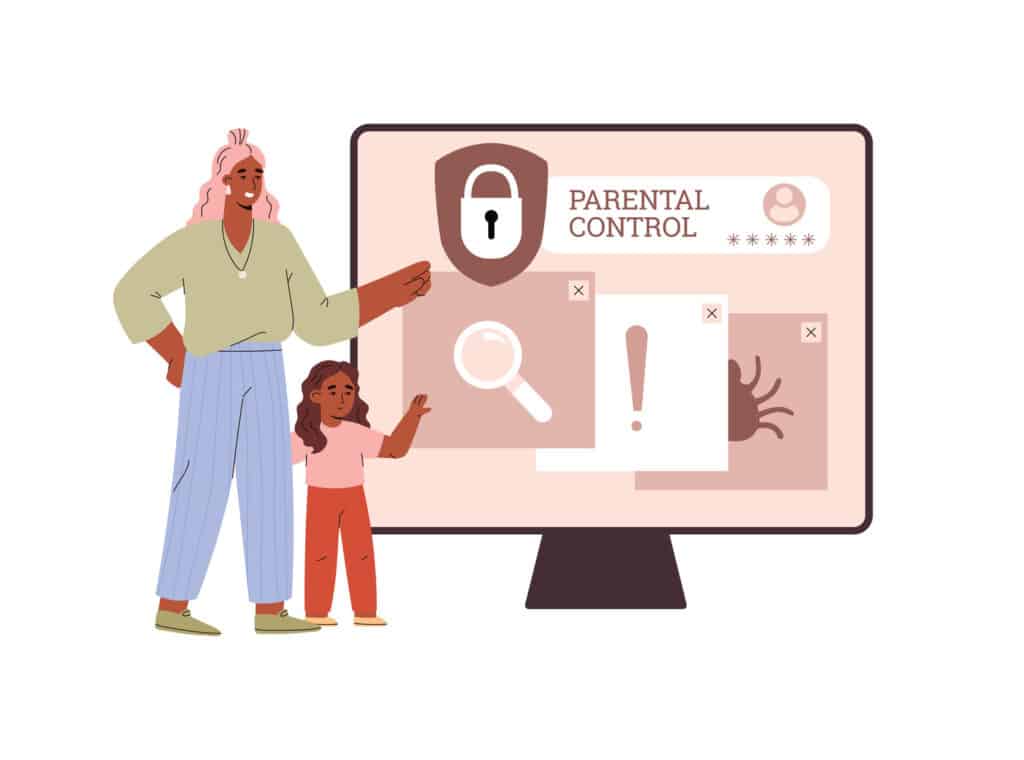Parents have a lot to monitor these days, and their child’s internet use is particularly significant.
Given the multitude of risks associated with inappropriate internet usage, learning about internet safety for your family can help create a healthier environment and safeguard your child’s well-being.
What is Internet Safety?
Internet safety refers to the practices, measures, and guidelines put in place to protect individuals from the dangers of the cyberworld. It involves understanding potential online risks — such as cyberbullying, identity theft, scams, and inappropriate content — and taking steps to mitigate these risks.
The internet has many uses, from research, education, and general communication, to games, shopping, and social media. While it offers many benefits to people of any age, the internet can be a double-edged sword, especially for kids.

Dangers of The Internet
With the ease of connection comes vulnerability. Many kids lack the skepticism and media literacy that a parent might have, leaving them exposed to online dangers. However, by educating ourselves and taking the adequate steps to prepare our children for internet usage, risks can be minimized and children can thrive.
Inappropriate content
The internet’s vastness and accessibility can allow kids to be exposed to explicit material, violence, or misinformation. This sort of content can deeply impact their psychological and emotional well-being.
Exposure to explicit content at a young age can distort their understanding of healthy relationships, desensitize them to violence, and even lead to behavioral issues. Additionally, misinformation or misleading content can influence their beliefs and attitudes, shaping their worldview in potentially harmful ways.
Cyberbullying
Cyberbullying refers to bullying that takes place over the internet or tech devices. It can occur through texts, messaging, or social media platforms. These interactions may involve sharing personal, embarrassing, private, harmful, and false information about a person.
A 2019 study showed that around 16% of youth in grades 9-12 had experienced cyberbullying at some point.
Cyberbullying can be difficult to identify and stop due to the channels it happens on. It’s hard to overhear or spot cyberbullying happening in real-time.
Because of the harmful or embarrassing nature of the information shared, kids and teens may find it challenging or nerve-wracking to come to an adult for help or support. Cyberbullying is also a unique concern because it can be lasting and permanent.
Peer Pressure
Peer pressure can feel like an inevitable part of childhood. Don’t we all just want to feel accepted and as though we belong? While parents have struggled with the effects of peer pressure for a while, it can be especially tricky to navigate when it happens online.
Research has shown that exposure to online content of friends engaging in risky behavior such as alcohol or drug use can increase a child’s chance of engaging in similar behaviors. Because of this, parents should consider encouraging their children to seek out positive peer spaces online and to be open if they are worried about their friends’ and peers’ online behavior.
Predators
An estimated 500,000 predators are online every day.
Online predators use the internet to establish relationships with minors, with the intention of exploiting them through grooming, manipulation, and sexual exploitation. These interactions happen through various channels such as social media, online gaming platforms, and message apps.
Children are inherently more trusting than adults and may not have the necessary skills to discern when a situation is unsafe or meant to take advantage of them.
If you feel your child may have been the target of an online predator, intervene and reach out for support. Whether that be another adult, school officials, or law enforcement, the safety and well-being of your child is the only priority that matters.
Cybersecurity problems
Especially risky on shared devices, your child’s online behavior could put your family’s cybersecurity in danger. Identity theft, phishing scams, and oversharing can affect the entire family negatively, and kids are often easy targets for these crimes.
It’s vital to ensure that all sensitive information is secured away from where children can access it and to instill in them never to provide private information, click an attachment link, or fill out an online form without a parent present.

How to Protect Your Kids Online
Access to the internet is a serious responsibility, and it can feel overwhelming to allow our kids online. Thankfully, you can take a few steps as a parent or guardian to ensure your child is safe in the digital realm.
Proper Device Usage
Proper device usage refers to using your tech devices for precisely what they are intended for and nothing more.
For computers, this may mean that children only access them for education and research, phones are used for parental-approved communication, and smartwatches are used for fitness and to-do list tracking.
It can be tempting for kids to turn their devices into all-inclusive entertainment systems by downloading the latest apps, messaging platforms, and games. These platforms can come with their own list of security concerns and safety risks.
You may find it easier to give your children devices that wholly block social media and inappropriate websites to ensure they are being used for their intended purpose.
Setting Internet Safety Rules and Boundaries
As children grow, it’s only natural that they’ll want to expand their online boundaries. The important thing is to introduce tech slowly and in safe and specific ways.
Set boundaries early and often around how children and teens access the internet, and provide clear rules and guidelines for your children to follow. It’s a good idea to limit their internet use to only happen on shared family devices in common spaces and set those devices as time-restricted or password-protected.
Limiting screen time and setting expectations for when online activity is acceptable is also essential. By doing so, you can encourage children and teens to use their online time meaningfully, limit their exposure to potentially unsafe online risks, and reduce any frustrating behavior that may arise from allowing too much screen time.
Online Safety Apps
As online safety concerns grow for children and teens, software developers have created several solutions to help fill any security gaps left when big tech companies simply tack on safety features to devices built for adults..
At Gabb, our philosophy is that kids and teens deserve tech designed specifically to fit their needs.
As always, parents should be transparent and communicative with kids about any monitoring apps they use to check in on them and be sure to vet those apps for their safety and security standards.

How To Talk To Your Kids About Internet Safety
The best approach to your child’s internet safety blends kid-safe tools with awareness, education, and communication. Knowing where to start when opening up a meaningful conversation about online safety can be challenging.
Still, with an intelligent approach and a competent game plan, you can ensure the whole family is on the same page about appropriate internet use.
Developing Transparency
Creating a transparent and open relationship with your child around their online use is one of the most important steps a parent can take to keep their child safe. Transparency requires parents to foster meaningful and compassionate communication patterns with their children.
Childhood and adolescence is both an awkward and vital time in a person’s life. While it can be uncomfortable or difficult for parents to hear some of the things that children may bring up after spending time online, the best way to handle it is by knowing the problem exists in the first place.
Many online safety issues arise privately, away from parents’ eyes. By fostering a transparent relationship with your child, you can increase the likelihood that they’ll come to you if they find themselves in danger.
Keep it age appropriate
Internet use should look drastically different at every age, and it’s important to keep conversations surrounding safety issues age-appropriate.
Only you as a parent can know when the time is right to increase your child’s access to the internet, but as you do, be sure to inform your child of the added safety risks at each stage and come up with your personal boundaries and needs as a parent ahead of time.
Kids can be good at negotiating for what they want, and staying firm in your commitment to your child’s wellbeing can help to ensure their safety is the first and only priority.
Create an action plan
While parents always want to hope for the best, it’s essential to plan for the worst. In addition to open and honest communication, education, and kid-safe tech, parents should have a plan if they feel their child is engaging in unsafe online activities.
Educate yourself so you can help your child through any uncertainty regarding internet safety, and create a network of parents to rely on for advice and support.
Decide what you’ll do if your child engages in risky online behavior, and ensure all parents or guardians in the child’s life are on the same page regarding appropriate internet use.
It can feel overwhelming to navigate your children’s online safety, and some safety risks faced by allowing internet access are uncomfortable and scary to consider.
As a parent, you know how to make wise and safe choices for your kids, and many resources are available to help you along your family’s digital journey. By staying informed, keeping the lines of communication open with your kids, and limiting online access, you can create a safer digital environment for your entire family and prioritize the well-being of your children.
Does your family have rules around internet usage? Share what those are in the comments below









Success!
Your comment has been submitted for review! We will notify you when it has been approved and posted!
Thank you!